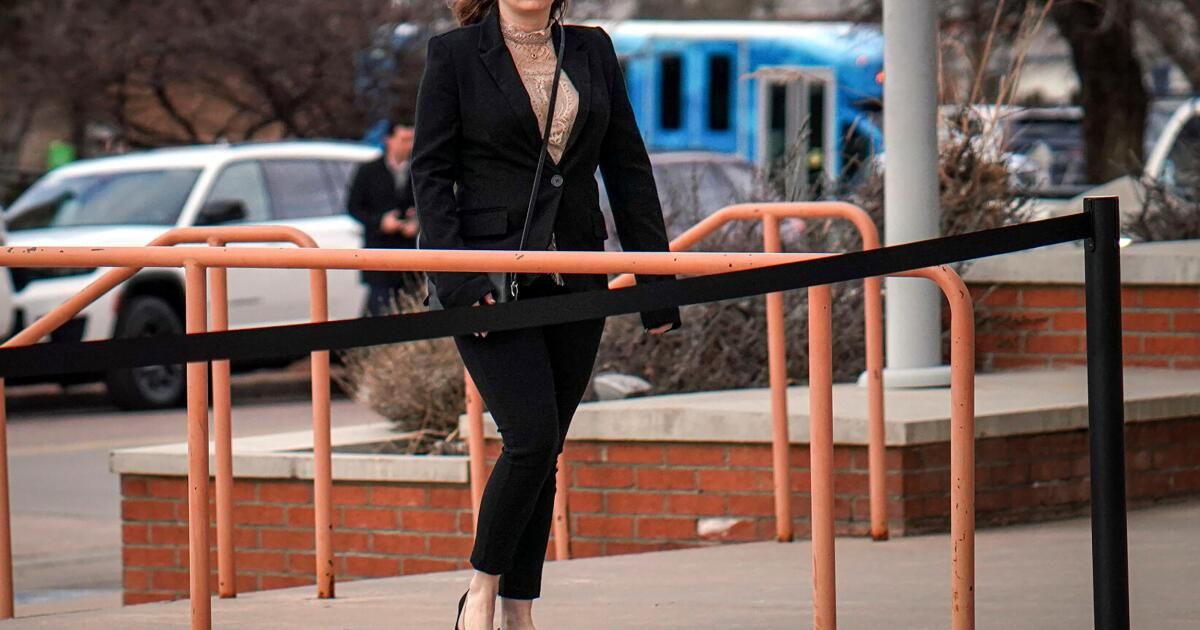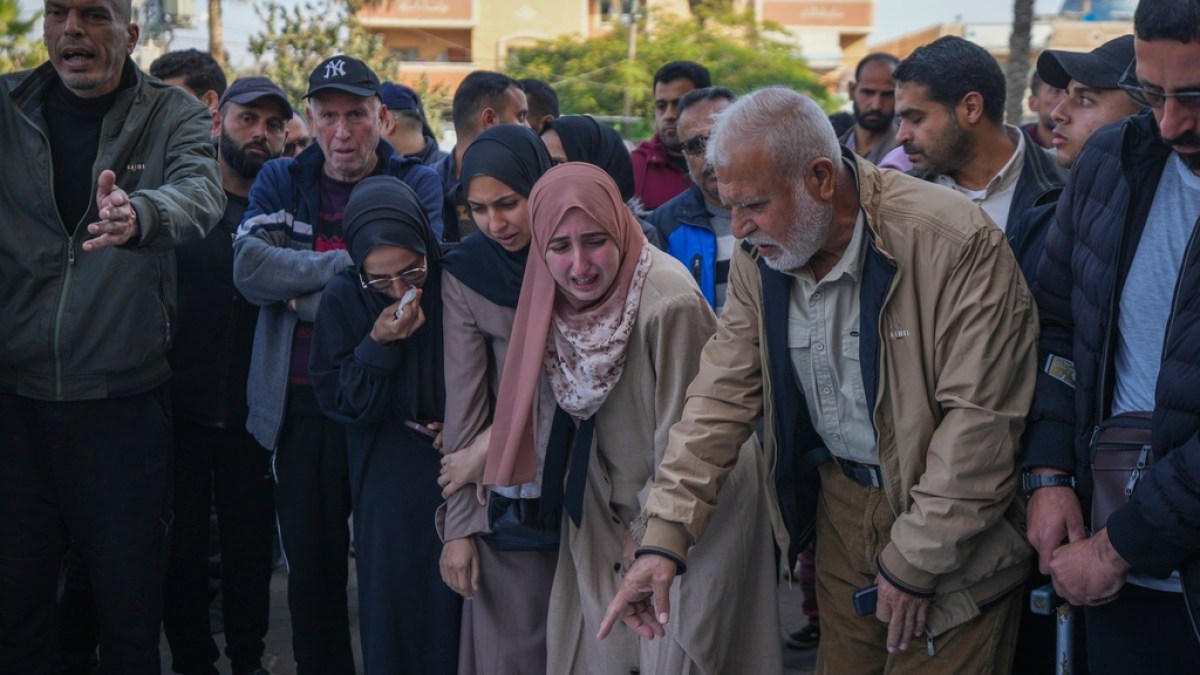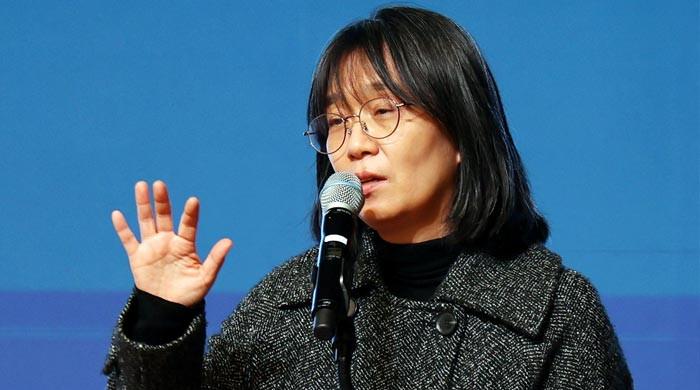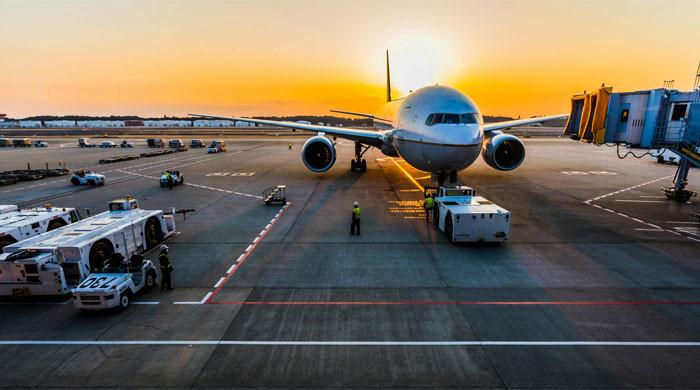More than two years after Alec Baldwin fired the deadly shot, questions persist about who was responsible for the accidental death of cinematographer Halyna Hutchins on the set of the western movie “Rust.”
After a long and bumpy prosecution, the first trial in the “Rust” shooting tragedy begins this week in a courtroom in Santa Fe, NM
Prosecutors will attempt to untangle a lingering mystery: How did at least six actual bullets get mixed in with so-called dummy and blank rounds common to moviemaking — including one lead bullet that was loaded in Baldwin's Colt .45 revolver on that fateful October 2021 day ?
Prosecutors allege that weapons handler Hannah Gutierrez was largely responsible for the death of Hutchins, a rising star in the film industry. They plan to ask a jury to convict Gutierrez on criminal charges that could send her to prison for three years, alleging that she was reckless and probably brought the live ammunition with her on only her second job as head armorer on a Hollywood movie.
The 26-year-old Arizona woman denies bringing live ammunition. She has pleaded not guilty to two counts of involuntary manslaughter, one count of evidence tampering and an unrelated gun possession charge.
On Wednesday, Gutierrez arrived with his attorney at the Santa Fe County Courthouse at 8 am, wearing a black suit and a high-collared, Champagne-colored blouse. The neon green and purple hair she sported during the “Rust” production more than two years ago was gone. Instead, her wavy brown hair was neatly pinned behind her ears.
In this screen record from lapel camera video provided by the Santa Fe County Sheriff's Office, movie set armorer Hannah Gutierrez, right, speaks with a sheriff's deputy. Assistant director David Halls, center, reacts to the fatal shooting on the set of “Rust.”
(The Associated Press)
Attorneys spent nearly eight hours Wednesday interviewing potential jurors. A few minutes after 5 pm local time, 16 jurors were selected, including four alternates who will hear evidence in the first high-profile trial stemming from the “Rust” tragedy.
Seven of the jurors are men; five are women. The alternates are men.
The proceedings, which will be televised by Court TV, begin Thursday and are expected to run through March 6.
Special prosecutor Kari T. Morrissey noted during Wednesday's session that “almost everyone” among the first pool of 70 potential jurors was familiar with the “Rust” shooting, cautioning that the process of picking the jury would be slow.
More than a dozen prospective jurors described hardships that would prevent extended service. One woman said her dog was having surgery, a procedure that she said could not be rescheduled. Late Wednesday, Morrissey asked prospective panelists whether they might be swayed by sympathy for Gutierrez because she was young and inexperienced. At least five potential jurors answered yes but said they would follow the judge's instructions on the law.
One man told the judge and attorneys that he felt Gutierrez “got a raw deal.” He was not selected to the panel.
Gutierrez is one of three people to face criminal charges in the 42-year-old cinematographer's death. Last month, a Santa Fe County grand jury indicted Baldwin on involuntary manslaughter charges. The actor, who has pleaded not guilty, could stand trial as early as this summer.
Baldwin thought his Colt .45 revolver was empty as he began rehearsing a scene in a wooden chapel at the popular movie location Bonanza Creek Ranch, just south of Santa Fe. He has denied pulling the trigger.
David Halls, the film's assistant director, had handed Baldwin the gun, saying it was “cold.” A year ago, Halls pleaded no contest to a misdemeanor charge, negligent use of a deadly weapon, in exchange for a suspended sentence.
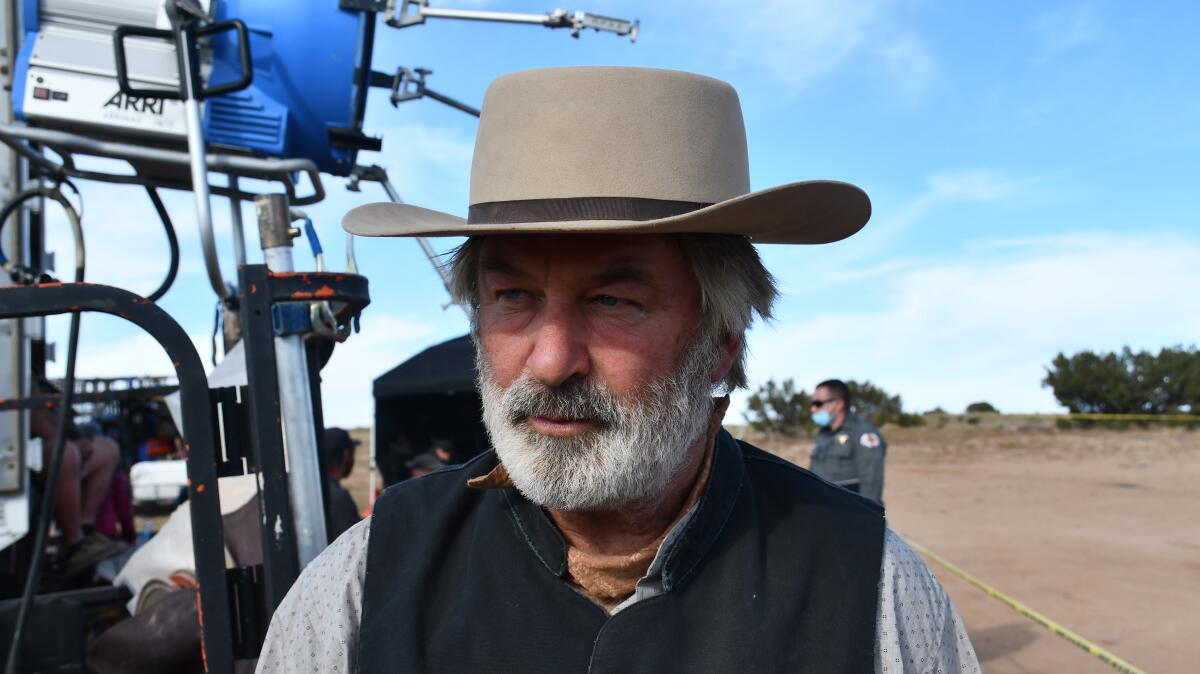
A photo released by the Santa Fe County Sheriff's Office shows Alec Baldwin immediately after the shooting of Halyna Hutchins and Joel Souza on the “Rust” set.
(Santa Fe County Sheriff's Office)
Baldwin has acknowledged pulling the hammer back and aiming the gun at Hutchins, who was standing about two feet away. Director Joel Souza was also injured.
“You don't wake up and go to work thinking that would be your last day,” Joyce M. Gilliard, founder of the nonprofit ISAFE (Industry Safety Awareness for Everyone) TV and Film, told The Times on Wednesday. “But another life lost — another death that could have been prevented.”
Gutierrez's “Rust” trial is getting underway 10 years after another movie set accident that injured Gilliard and claimed the life of Sarah Jones, a camera assistant. Both women were crew members working on a railway trestle to prepare a scene for “Midnight Rider,” a Gregg Allman biopic, when a train slammed into them.
“We really have to keep safety as the top of our priorities when shooting films. Period,” Gilliard said. “In 'Rust,' there were safety protocols in place, but they weren't followed.”
For the last year, special prosecutors have built the case against Gutierrez, who has acknowledged loading Baldwin's Colt .45 caliber revolver with what she thought were “dummy” bullets.
Albuquerque attorney Jason Bowles has insisted that Gutierrez, his client, is being unfairly blamed for a series of on-set actions and lapses that led to the fatal shooting. Bowles alleges that Gutierrez was spread too thin, struggling to balance two jobs on the low-budget film because producers were allegedly driven to cut safety corners to save money. Producers have denied the claim.
Several crew members have made such complaints. More than six members of the “Rust” camera crew resigned the night before the accident, citing safety concerns and a lack of nearby lodging.
New Mexico's Occupational Safety and Health Bureau blamed producers for Hutchins' death. “Rust did not provide staff responsible for ensuring firearms safety with sufficient time to inspect ammunition received to ensure that no live rounds were present,” according to the investigation summary.
Gutierrez — the daughter of Hollywood sharpshooter Thell Reed who took a job that others with more experience had turned down — had asked for the opportunity to provide additional gun training for Baldwin. But production managers refused her request, text messages showed. She was also scolded for devoting too much time to handling weapons, neglecting some of the duties of her secondary role as prop assistant.
Prosecutors have introduced allegations of drug use by Gutierrez during his off-hours.
First Judicial District Judge Mary Marlowe Sommer earlier this month agreed to allow into evidence some of Gutierrez's text messages that allude to drug use, including getting high in a hotel Jacuzzi the night before Hutchins was shot.
“That could be impactful evidence to a jury,” said former federal prosecutor John P. Fishwick.
Prosecutors plan to call a former friend of Gutierrez who has testified that on the night of the shooting she stayed with Gutierrez until deputies came to the hotel room to check on Gutierrez. The armorer allegedly handed her a small plastic baggie, with another bag tucked inside it.
The friend testified that it contained “a white powdery substance, which I knew to be cocaine; or I mean, it could have been meth or something, too,” according to a deposition transcript viewed by The Times.
Gutierrez's team has disputed that Gutierrez was impaired or that the bag contained drugs, which gave rise to the evidence tampering charge.
Sheriff's detectives investigating the accident did not find evidence of drug use, although they did not test crew members for the presence of drugs or alcohol.
“This is a challenge for the defendant,” Fishwick said. “The prosecutors will say: 'She hid evidence, and so you can't trust this person.' That might give momentum to the bigger charge — manslaughter.”
The prosecution has been dogged by missteps and problems with evidence. Morrissey and another special prosecutor, Jason J. Lewis, took over the case last spring after Gutierrez and Baldwin were initially charged.
The film's property master, Sarah Zachry, told police that she threw away bullets from another gun immediately after the shooting. FBI weapons experts shattered the hammer of Baldwin's gun during 2022 ballistics testing.
And investigators never uncovered the source of the bullets.
“The prosecutors say that they're going to prove that [Gutierrez] brought the bullets herself, which we haven't seen any strong evidence on,” Joshua Kastenberg, a University of New Mexico law professor, said this week. “When the prosecutor says substantial evidence, they're not saying they can prove it with absolute certainty.”
“But I think this 'substantial evidence' is going to build a bridge to what actually happened,” Kastenberg said.

